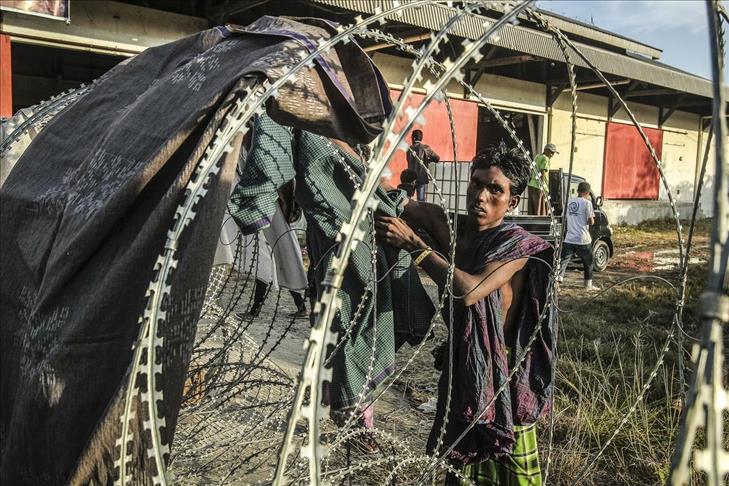
By Max Constant
BANGKOK
An international human rights group has called on Thailand and Myanmar to abandon “unhelpful and unacceptable” policies on Muslim Rohingya and Bangladeshis making the perilous journey across the Bay of Bengal toward the Andaman Sea’s coastline.
The deputy-director for Asia at Human Rights Watch told Anadolu Agency on Monday that the countries must adopt a responsible attitude in facing the boat people crisis hitting Southeast Asia.
“By considering the boatpeople neither as refugees nor as migrant workers and putting them in detention, Thailand is causing trouble for itself,” Philip Robertson said, calling the approach “irresponsible.”
“We have a mixed flow of people, with Rohingya from western Burma [officially named Myanmar] and Bangladeshi,” he said. “But Thailand is putting the United Nations High Commissioner for Refugees away.”
He warned that without a UN screening process, “these people will not be able to resettle in a third country, and it will be also difficult for Bangladesh to take back its citizens.”
While accurate figures are difficult to gather, NGOs have estimated that there are roughly an equal number of Rohingya from Myanmar’s Rakhine state and Bangladeshi - mostly from the Cox’s Bazar area - arriving at Southeast Asian shores.
Further complicating the picture is the fact that some Rohingya living in Bangladesh - either in or outside refugees camp along the Myanmar border - are also fleeing on the same boats.
And if most migrants are departing voluntarily, fleeing persecution and deprivation of rights in Rakhine, or looking for better economic opportunities, others are kidnapped and forced to board the smugglers’ rickety vessels.
Even in Malaysia and Indonesia, who agreed last week to temporarily shelter migrants adrift at sea while allowing UN involvement, the process of screening different groups of migrants will be no easy task.
Bangladeshis, likely to be considered economic migrants in most cases, could be repatriated.
The Rohingya, who have been denied citizenship by Myanmar and kept in squalid camps since 2012, have a higher chance of being considered political refugees - and thus resettled in third countries like the U.S. or the Philippines.
“Most Bangladeshi have paid a lot of money to make the trip and will not be willing to go back to Bangladesh,” Robertson told Anadolu Agency.
In an opinion piece published in the Bangkok Post this weekend, an adviser to Myanmar President Thein Sein contended there were very few - if any - Rohingya among the boat people, with the vast majority being Bangladeshi.
“President Thein Sein said… that most boat people are expected to assume themselves to be Rohingya from Myanmar in the hope of receiving assistance from the UNHCR,” Zaw Htay wrote.
In Robertson’s view, the priority “is that the screening process is done professionally by agencies who have the expertise, mostly the UNHCR and some other international organizations, like the International Organization for Migration.”
The International Organization for Migration will have to determine who among the migrants are human trafficking victims.
He added, however, that a crucial factor in the crisis was the “unacceptable policies of Burmese authorities towards the Rohingya.”
The most recent example, he said, is a “population control healthcare law” approved by Myanmar’s president May 19 that empowers regional governments to introduce family planning regulations in order to lower birth rates in their states.
The law allows local authorities to require women to observe a 36-month interval each child and to implement forced contraception.
“The prime target of this law are the Rohingya,” said Robertson.
“If Burma wants to continue to be considered as a country progressing towards democracy, it needs to change its policies towards the Roghingya,” he stressed.
There is some hope for a more concerted response to the growing issue following Myanmar’s decision – albeit after some initial reluctance - to participate in a regional meeting on the crisis to be held Friday in Bangkok.
Representatives from Thailand, Malaysia, Indonesia and the Philippines - as well as U.S. and Australian observers – are expected to attend the talks.
“It is important that Thailand’s viewpoint, as chairman of the meeting, is counterbalanced by others, for instance the Philippines,” said Robertson.
The Philippines was the first country to offer to welcome migrants on its soil as a humanitarian gesture, despite no boats being adrift off the archipelago’s coast.
“Why is it so difficult for Thailand to provide temporary refugee status for these people? It is mindboggling,” Robertson said.
Anadolu Agency website contains only a portion of the news stories offered to subscribers in the AA News Broadcasting System (HAS), and in summarized form. Please contact us for subscription options.

